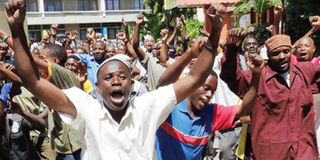Breaking News: At least 10 feared to have drowned in Makueni river
Crisis security talks over MRC decision

Mombasa Republican Council supporters celebrate outside the Mombasa High Court after judges lifted the ban on the group on July 25, 2012. Photo/LABAN WALLOGA
Top security officials meet today in an emergency session to discuss a court ruling that lifted the ban on secessionist group Mombasa Republican Council.
The meeting was called by acting Head of Civil Service Francis Kimemia amid fears that the ruling could embolden 32 other outlawed gangs to regroup and cause chaos.
“An urgent national security committee meeting has been called tomorrow (today) to address the grave implications following today’s (Wednesday) ruling on the MRC. The rule of law will continue to be enforced without fear or favour. The government assures Kenyans of their security and that of their property countrywide,” Mr Kimemia said in a statement.
Three High Court judges ruled that the Kenya Gazette notice that outlawed MRC was unconstitutional.
The group advocates the secession of Coast Province, citing historical injustices.
Judges John Mwera, Mary Kasango and Francis Tuiyott said the State had failed to demonstrate that the ban was justifiable and proportionate.
“The respondents ought to have satisfied the court that less restrictive means would not have been efficacious to deal with the perceived challenges posed by MRC,” they said.
Though the judges stated categorically that the ruling affected only the MRC, their decision could pave the way for other illegal groups, including Al- Shabaab, to challenge the order that banned 32 groups in 2010.
The groups include Mungiki in Central, Angola Msumbiji and Sabaot Land Defence Force in Western and Chinkororo in Nyanza.
The ruling drew immediate condemnation from police, government and politicians, who warned that it imperiled national peace and stability.
Attorney-General Githu Muigai said he would appeal.
“The A-G shall be appealing against the decision on the grounds that the court decision failed to consider the legitimate constitutional concerns of the government in ensuring that any group or organisation challenging the constitutional authority and territorial integrity of the Republic of Kenya cannot enjoy protection by the Constitution,” he said in a statement signed on his behalf by senior deputy Solicitor-General Muthoni Kimani.
Naivasha MP John Mututho proposed a referendum to decide on such divisive issues, arguing that courts were unilaterally chopping up the Constitution.
Medical Services assistant minister Kambi Kazungu said the court had failed Kenyans.
“What is it that these judges know that we don’t know? How do you give a green light to an illegal group?” he asked.
Migori MP John Pesa said the ruling was a big surprise.
“The ruling was not in favour of what is good for the nation and we should now look at how to solve the problem,” he stated.
Police spokesman Eric Kiraithe said: “We’ve not seen the ruling. We want to study it first and then determine the next course of action.”
Asked if the police would continue the crackdown on the outlawed groups, he said: “Because we have not seen and studied the ruling, we cannot purport to know what it means in regard to the others (proscribed groups).”
A senior officer, who requested anonymity for fear of jeopardising police relations with the Judiciary, said the court “apparently did not realise the key role it plays in the social-political stability of this country”.
The judges said the minister for Internal Security had overreacted to the threat posed by the MRC.
“Was it open to the State to invoke the criminal justice system against errant members of the group instead of slapping a total ban on the group? Did the State first issue warnings to the group to abide by the law? If the State was concerned that the group was opaque and amorphous, did it require the group to apply for formal registration as a society or political party before imposing the harshest possible measure?”
The court said the MRC should have been given an opportunity to seek registration before it was banned since it was a political movement.
“Secession is a political agenda. MRC is certainly not a trade union, welfare society or a debating society. It has all the attributes of a political movement.”
MRC members Randu Ruwa, Robert Tukwatukwa and Nyae Ngao moved to court in 2010 challenging the ban.
Through lawyer Steve Kithi, they claimed the order infringed on their right to association and political expression.
The judges also advised the MRC to seek registration, but warned the ruling was not a blank slate to engage in criminal activities.
“If MRC regards this decision as carte blance to disorder or lawlessness, then they are on their own. The court cannot mute the respondents from exercising their constitutionally ordained obligation of ensuring security for all Kenyans. Should MRC cross the line, then the State, as always can invoke the law including Prevention of Crimes Act.”
Justice Tuiyott, who read the judgment, said the Constitution did not provide for secession.
“If MRC’s were to push this agenda by violence or means that violate the law and the Constitution, then it would be engaging in criminal activity,” the judges said.
He added: “There may be Kenyans who may disenchanted with our decision. Some would see it as an endorsement to secession and dismembering of this country. To them we say: Secession can only be achieved by far-reaching amendment to the Constitution.”
Defending the ban, the then former Internal Security Permanent Secretary Francis Kimemia (now head of public service) said MRC was outlawed because its activities were a threat to national peace.




